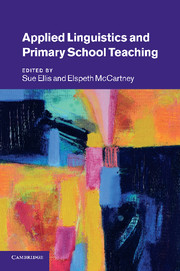Book contents
- Frontmatter
- Contents
- List of figures
- List of tables
- Notes on contributors
- Preface
- Editors' notes and conventions
- Introduction
- Part I Policy and diversity in the twenty-first-century primary school
- Part II The range and focus of applied linguistics research
- Introduction to Part II
- 6 Grammar for designers: how grammar supports the development of writing
- 7 The use of corpus-based approaches in children's knowledge about language
- 8 Words and pictures: towards a linguistic understanding of picture books and reading pedagogy
- 9 From storytellers to narrators: how can the history of reading help with understanding reading comprehension?
- 10 Talk about text: the discursive construction of what it means to be a reader
- 11 Why we need to know about more than phonics to teach English literacy
- 12 Understanding children's reading comprehension difficulties
- 13 Classroom discourse: the promise and complexity of dialogic practice
- 14 Pedagogy and bilingual pupils in primary schools: certainties from applied linguistics
- Part III Empowering teachers and teachers' use of knowledge
- References
- Index
Introduction to Part II
Published online by Cambridge University Press: 26 April 2011
- Frontmatter
- Contents
- List of figures
- List of tables
- Notes on contributors
- Preface
- Editors' notes and conventions
- Introduction
- Part I Policy and diversity in the twenty-first-century primary school
- Part II The range and focus of applied linguistics research
- Introduction to Part II
- 6 Grammar for designers: how grammar supports the development of writing
- 7 The use of corpus-based approaches in children's knowledge about language
- 8 Words and pictures: towards a linguistic understanding of picture books and reading pedagogy
- 9 From storytellers to narrators: how can the history of reading help with understanding reading comprehension?
- 10 Talk about text: the discursive construction of what it means to be a reader
- 11 Why we need to know about more than phonics to teach English literacy
- 12 Understanding children's reading comprehension difficulties
- 13 Classroom discourse: the promise and complexity of dialogic practice
- 14 Pedagogy and bilingual pupils in primary schools: certainties from applied linguistics
- Part III Empowering teachers and teachers' use of knowledge
- References
- Index
Summary
The chapters in Part II provide examples of the new knowledge that is being generated by applied linguistics research. This knowledge has implications for the primary school curricular content, for pedagogy and for policy development in the primary sector.
It would require a work of many volumes to give a comprehensive account of all the applied linguistics research that has implications for primary school teaching. These chapters, therefore, are illustrative of the range and scope of such research. The chapters represent a range of disciplines and enquiry methods. They show the different ways that research is addressing the concerns of primary teachers and policy makers, with implications that range from curriculum content to pedagogy, teacher understanding, and language and literacy policy and policy implementation.
Part II begins with two chapters describing research that challenges traditional conceptions of grammar teaching. Whereas traditional grammarians often focus on what people should say and write, Debra Myhill focuses on what people could say and write whilst Alison Sealey focuses on what they do actually say and write. Myhill's research asks teachers and children to focus on writers as designers, so that how they tell becomes as important as what they tell in their writing. This produces a pedagogy that promotes creative and critical understandings of language choices and their effects, and challenges traditional ways of teaching both writing and grammar.
- Type
- Chapter
- Information
- Applied Linguistics and Primary School Teaching , pp. 77 - 80Publisher: Cambridge University PressPrint publication year: 2011



